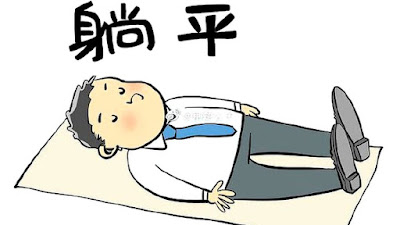Fed up with a culture of overwork, through-the-roof housing prices and skyrocketing living costs, many Chinese youth are "lying flat" to express their frustration with little reward and the lack of upward social mobility.
The new trend, known as "tang ping", is described as an antidote to society's pressures to find jobs and perform well while working long shifts.
The first
online reference to the term appeared in March in the discussion forum Tieba.
The anonymous post "Lying Flat Is Justice" described how to live a
happy life without a stable income. "You just lie flat. Lying flat at
home, lying flat outside, lying flat like the street cats and dogs. ... I
choose to lie flat, and I'm no longer stressed," the post said.
Lying flat includes opting out of getting married, having children, purchasing a home or car, and joining the corporate money-making machine. The tang ping movement embraces doing the bare minimum to maintain a minimalist lifestyle. It rejects the so-called "996 life" of working 9 a.m. to 9 p.m. six days a week, a schedule that often fails to provide sufficient income for exhausted workers to get ahead.
In the
COVID-19-influenced job market, the Class of 2021 is competing for jobs with
the still-unemployed members of the Class of 2020. And because the
post-pandemic recovery has been driven by an expansion of blue-collar jobs,
lying flat makes sense to many university graduates.
"I
graduated from a top university in Nanjing with a degree in architecture two
years ago, but I struggled to find a job," said Zhang, a 24-year-old
living in the rural area of China's southwest Sichuan province, of his choice
to lie flat. Zhang said that a lot of his classmates and friends are still
trying to find their way in big cities, "but they come back home either
with diseases from overworking or with a mountain of debt."
"I
chose to lie flat from the beginning. It's too hard to buy a house and a car in
big cities. It's hard to find someone to marry, and if you have kids, you have
to enroll them in all sorts of activities to give them a head start," he
said. "So I chose my current lifestyle. Simple food, simple life, some gigs to make a little bit of
money."
Analysts
say the lying flat attitude is rooted in the lack of upward social mobility.
People born in the '50s, '60s and '70s benefited from Deng Xiaoping's 1978 policy, a series of transformative
economic reforms that opened China up to the international community and
foreign investment. The reform set the stage for the emergence of Chinese
companies with international reach, such as Huawei and Alibaba.
Yet the
current generation finds that they no longer have the same opportunities as
their parents to achieve upward mobility.
According
to 2017 data from the latest Chinese survey by the Chinese Academy of
Social Science, people under 35 experienced a high level of unstable employment
and relatively low salaries, partly due to the economic slowdown in 2015 and
2016. One of the survey's key findings is that college graduates in China face
difficulties getting jobs. And if they do,
many feel they're expected to overwork.
Lucy Li,
35, works in the banking industry in Beijing. "I know 996 is prevalent in
the tech industry, but now it has spread to every sector. In our bank, the
leadership will drop by unannounced around 8 p.m. to see who's still working,
and those still in the office are the ones getting promoted. So everyone ends
up working 12 hours a day. It's just not sustainable."
Another
worker, Wang, said he quit his job with the tech giant Alibaba because he often
started work around 9 a.m., returned home around 7 p.m. and then returned to
the office after his two children went to bed, or around 9 p.m. Back at the
office, he usually worked until midnight — or as late as 2-3 a.m. if he was
developing a product or it was the busy season.
The 996
culture has led to death by overwork, a phenomenon first recognized in Japan's
workplace culture, or karoshi. Japan passed the Work Style Reform
Bill in 2018
to limit brutally long work weeks.
Earlier
this year in China, the deaths of two employees of the online agricultural
marketplace Pinduoduo sparked discussion of overwork. Many young people took to
social media to say they didn't want the 996 lifestyle, and they started to
advocate for a more relaxed attitude toward work.
The
official Xinhua News Agency wrote in a commentary
published last month that "lying flat is shameful. Only hard work brings
happiness."
Xinhua later posted a video of an 86-year-old Chinese scientist surnamed Zhao who wakes up at 4 a.m. each morning to go to work. "After his retirement, he still works for 10-12 hours a day voluntarily for the country and for the people," Xinhua said
From VOA News and BBC (edited)



